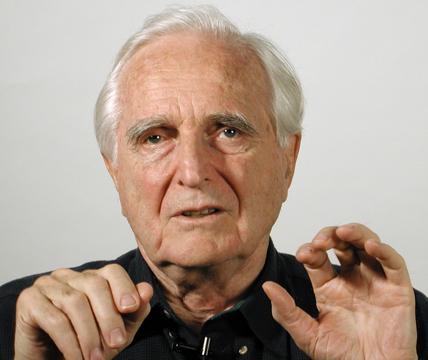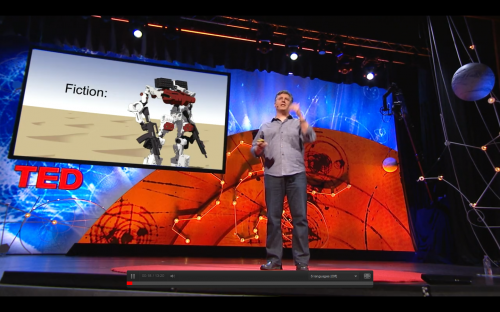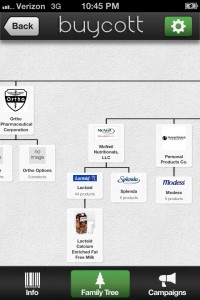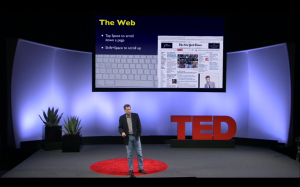 The Internet makes it possible for people to collaborate on a massive scale, working together to accomplish tasks that might otherwise be impossible. The world of online collaboration is changing rapidly—and changing our lives in the process. Many TED talks and NPR podcasts have helped us to understand the applications and implications of collaborative technology. In this fascinating radio program, TED and NPR collaborate to explore collaboration by combining excerpts from several TED talks with interviews and commentary.
The Internet makes it possible for people to collaborate on a massive scale, working together to accomplish tasks that might otherwise be impossible. The world of online collaboration is changing rapidly—and changing our lives in the process. Many TED talks and NPR podcasts have helped us to understand the applications and implications of collaborative technology. In this fascinating radio program, TED and NPR collaborate to explore collaboration by combining excerpts from several TED talks with interviews and commentary.
www.npr.org/2013/07/13/197986218/why-we-collaborate
 If you’re reading this, take a moment to thank Doug Engelbart. At a time when computers were big, expensive, isolated, finicky, and terribly difficult to program and use, this unassuming genius had a vision of a digital future that was so far ahead of its time that few of his peers took it seriously. He is widely credited with inventing the mouse, but that’s just a tiny part of his grand vision. Graphical user interfaces, interactive computing, the Internet, and more, owe their existence at least in part to Engelbart’s visionary work. Thank you, Doug.
If you’re reading this, take a moment to thank Doug Engelbart. At a time when computers were big, expensive, isolated, finicky, and terribly difficult to program and use, this unassuming genius had a vision of a digital future that was so far ahead of its time that few of his peers took it seriously. He is widely credited with inventing the mouse, but that’s just a tiny part of his grand vision. Graphical user interfaces, interactive computing, the Internet, and more, owe their existence at least in part to Engelbart’s visionary work. Thank you, Doug.
http://www.nytimes.com/2013/07/04/technology/douglas-c-engelbart-inventor-of-the-computer-mouse-dies-at-88.html?pagewanted=1&_r=1&smid=tw-share
 The robot drone is rapidly changing the face of war—and peace. In this gripping TED talk Daniel Suarez describes the very real—and very scary—threats robotic weapons pose to civilized society. He makes a compelling case for an international treaty on robotic arms control and a global ban on killer robots.
The robot drone is rapidly changing the face of war—and peace. In this gripping TED talk Daniel Suarez describes the very real—and very scary—threats robotic weapons pose to civilized society. He makes a compelling case for an international treaty on robotic arms control and a global ban on killer robots.
http://www.ted.com/talks/daniel_suarez_the_kill_decision_shouldn_t_belong_to_a_robot.html
 Patents have been part of American life since the country was born—they were written into the constitution to legally protect and encourage innovation, creativity, and productivity. But today, patents are used by shadowy companies that make nothing more than profits—and the threat of lawsuits from these companies is enough to keep people from creating high-tech products, companies, and jobs. This episode of This American Life shines a bright light on the broken intellectual property legal system by telling the stories of people whose lives have been profoundly impacted by that system.
Patents have been part of American life since the country was born—they were written into the constitution to legally protect and encourage innovation, creativity, and productivity. But today, patents are used by shadowy companies that make nothing more than profits—and the threat of lawsuits from these companies is enough to keep people from creating high-tech products, companies, and jobs. This episode of This American Life shines a bright light on the broken intellectual property legal system by telling the stories of people whose lives have been profoundly impacted by that system.
thisamericanlife.org/radio-archives/episode/496/when-patents-attack-part-two
 Did you ever wonder who gets your money when you go shopping? You may, without knowing it, be donating your hard-earned cash to people and corporations who use it to fund campaigns that go against your beliefs and values. This Forbes article describes Buycott, a smart phone app that can instantly reveal the secret origins of the items in your shopping cart. Whether you’re concerned about a cleaner environment or a more equitable society or something else, technology can help you vote with your wallet every time you shop.
Did you ever wonder who gets your money when you go shopping? You may, without knowing it, be donating your hard-earned cash to people and corporations who use it to fund campaigns that go against your beliefs and values. This Forbes article describes Buycott, a smart phone app that can instantly reveal the secret origins of the items in your shopping cart. Whether you’re concerned about a cleaner environment or a more equitable society or something else, technology can help you vote with your wallet every time you shop.
forbes.com/sites/clareoconnor/2013/05/14/new-app-lets-you-boycott-koch-brothers-monsanto-and-more-by-scanning-your-shopping-cart/
 MIDI is the communication standard for electronic musical instruments. This 30-year-old technology has revolutionized the music industry. This NPR piece explains why and how MIDI made digital music happen.
MIDI is the communication standard for electronic musical instruments. This 30-year-old technology has revolutionized the music industry. This NPR piece explains why and how MIDI made digital music happen.
npr.org/blogs/therecord/2013/05/12/182874125/the-midi-revolution-synthesizing-music-for-the-masses
 When Apple released the iPhone, the world changed. People were carrying powerful computers in their pockets and purses. Developers released a bevy of creative apps to harness that always-available computing power. Today it’s hard to imagine a world without smart phones. Could Google Glass, the wear-on-your-face computer from Google, be the beginning of the next revolution in personal computing? This short NPR story explains how early adopters plan to use their prototype high-tech specs.
When Apple released the iPhone, the world changed. People were carrying powerful computers in their pockets and purses. Developers released a bevy of creative apps to harness that always-available computing power. Today it’s hard to imagine a world without smart phones. Could Google Glass, the wear-on-your-face computer from Google, be the beginning of the next revolution in personal computing? This short NPR story explains how early adopters plan to use their prototype high-tech specs.
npr.org/blogs/alltechconsidered/2013/04/17/177557810/Seeing-The-World-Through-Google-Colored-Glasses
Of course, not everyone views Google Glass through such rose-colored lenses. This Saturday Night Live skit mocks the idea that Google Glass can be used discreetly; other detractors question our need to become even more dependent on our technology.
mashable.com/2013/05/05/snl-google-glass-parody/
What’s it like to be the world Jeopardy champion and lose to a computer? Ken Jennings can tell you, and he does in this engaging TED talk. From his unique perspective, he suggests that we can—and must—make a choice about the kind of future we want to have. Which world do you want to live in?
More about Watson:
 David Pogue is one of the most prolific–and entertaining–tech writers we know. In this short TED talk, he runs through a list of tips that can save you time every day. Don’t miss it.
David Pogue is one of the most prolific–and entertaining–tech writers we know. In this short TED talk, he runs through a list of tips that can save you time every day. Don’t miss it.
 If you misspell a word in a paper or use the wrong font in a presentation, your error may be embarrassing. If you use the wrong formula in a spreadsheet, your error might be devastating. According to a recent study, the typical spreadsheet is riddled with math errors. This short Market Watch article should serve as a wake-up call to scientists, engineers, business people, students and others who do high-consequence work with numbers.
If you misspell a word in a paper or use the wrong font in a presentation, your error may be embarrassing. If you use the wrong formula in a spreadsheet, your error might be devastating. According to a recent study, the typical spreadsheet is riddled with math errors. This short Market Watch article should serve as a wake-up call to scientists, engineers, business people, students and others who do high-consequence work with numbers.
marketwatch.com/Story/story/print?guid=DB151EDA-A776-11E2-A57C-002128040CF6